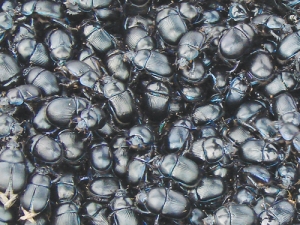The first major commercial release of dung beetles to New Zealand farms will occur this spring, says Dung Beetles Innovations co-founder Shaun Forgie.
Further species of beetle are also being brought into the country from Western Australia to give year-round coverage.
A new company called Dung Beetle Innovations has been formed which has a facility at South Head in the north-west Auckland region where mass breeding is being carried out of several species which have already imported.
“Those should fill all the standing orders we have at the moment with the main releases next spring,” Forgie told Dairy News.
“We have been doing some releases already via Dung Beetle Innovations but the main bulk will commence in spring once we’ve got the numbers up to maximum carrying capacity at the facility.
“We have got these key species being mass reared but there are several species yet to be imported and they will fill the gaps in seasonal activity, so we have some in summer and some for winter.
“We have yet to bring in the species that will complement those that are already here, to make sure we have a presence of dung beetles year-round on our paddocks. Basically the process now is putting those species into containment facilities.”
All are coming from Western Australia and the first is Onitis alexis alexis.
“We have disease tested it, it has worked out clean and well and we’ve got approval to release it from containment. So that is in a process now of emerging because we brought them as brood balls, as eggs and larvae, and they are starting to emerge as adults.
“So hopefully those will start producing a new breeding colony of an additional species.”
The species is a prolific burier of livestock dung from spring to autumn in an array of different soil conditions particularly clay and sand based loamy soils throughout much of NZ. One hundred eggs and larvae were brought in from Australia in February.
Forgie says in about a month the company will look at a second species called bubas bison, a winter active beetle, followed a month later by another species Copris hispanus. They are specialist beetles for particular areas in the country and both will also come from Western Australia.
“The main releases in spring will be the ones they have mass produced at the moment – we have orders all around the country and they are bulk releases on both organic and conventional farms,” says Forgie.
“They will be released from mid to late spring onwards.”
Dung Beetle Innovations has a waiting list and has deliberately not advertised and promoted because they did not want to keep too many people waiting. They want to clear the list of those people who have been waiting for a while before they start loading on more.
“We will start loading more people on as the beetles come on line through the summer onwards.”
He says they will start advertising because they will be capable of filling those orders from summer onwards. “We are not discouraging people from asking. If people are very interested in dung beetles then we simply put them on the list and they are the next in line for receiving beetles.”
Forgie says he sees dung beetles as significant part of the solution on farm for effluent management.
“From what the latest studies from people at Landcare Research show is that fencing plus dung beetles contribute perhaps the most significant combined effort for reducing the amount of contaminants entering our waterways. We use E.coli as an indicator and we know, from models at least, that we can significantly reduce that by fencing plus dung beetles.
“Dung beetles offer a year round solution but they are part of the solution. They do a significant lot of things in terms of improved benefits however they are part of the solution.
“There’s riparian planting, there’s fencing but dung beetles in my mind would probably be the most significant of all of those,” Forgie says.
Dung beetle strategy
The Dung Beetle Release Strategy Group was established in New Zealand by a group of farmers and other interested parties in 2008 with the objective of importing and releasing dung beetles to assist with the removal of pastoral dung of agricultural livestock.
An application by the group to release 11 species of dung beetles in New Zealand was approved by the Environmental Risk Management Authority in February 2011, and a project to import and breed up these beneficial insects was funded by the Sustainable Farming Fund with Landcare Research providing science and technical support.
Dung Beetle Innovations was established for the commercial release of the beetles.
See www.dungbeetle.org.nz


















